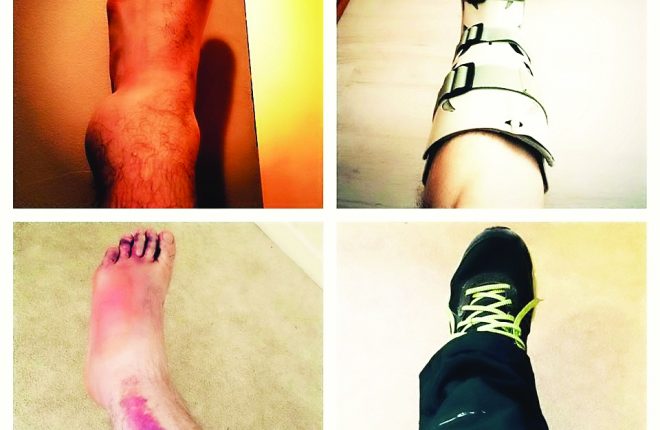
Ankle injuries can range from the mild to the disastrous. It’s important to know how to handle the mental repercussions of injury
You can do all the off-season prep in the world; strength training, mobility training, pool sessions, frequent sports massage, even throw in extensive warm ups before sessions, injuries will still happen.
Some man will just plough through you when you’re going down to pick up the ball, your boot will get caught in the ground as you turn to take off or you might land badly after an almighty field of the ball. Injuries will happen.
You take that on the chin though. It’s part and parcel of the game we love. And it’s a great leveller. It can happen to the man who sits on the bench for the reserves, or the best player of a generation.
It’s how you handle coming back from those injuries that makes the difference. If you’ve never suffered a serious injury I’ll let you in on a secret. Rehab is boring. It’s monotonous, it’s frustrating and it’s a serious mental battle.
You’re being asked to do exercises that the previous week you could have done in your sleep, yet today it seems like the most difficult thing in the world. All the while your teammates are going full steam around you. Rehabilitating from an injury is as much a mental battle as it is a physical one. The body’s a wonderful thing though, if you put the work in, it will heal.
Your challenge as an injured player is twofold. Listen to what your physiotherapist tells you, do it to the best of your ability, and be patient. Manage your body. Don’t rush your return. Better you miss one extra game than play it and undo all the rehab work you’ve done.
Pride plays a big role in injuries. Sometimes we think we’re indestructible, but we aren’t. We’re flesh and bone, muscle and sinew, and if that body aches you need to learn to manage it.
Don’t be afraid to talk to management about how your body is holding up too. If they’re worth their salt they’ll be concerned with how you’re doing. You mightn’t be able to train every night. You might have to sit out one of the team training sessions per week. To get the most from your body, less may be more. That is a conversation that must be had with your management, and one that could be the difference in you being a major contributor to your team’s success versus spending a season on the treatment table.
If you liked this article and need a daily dose of motivation, training tips and dietary advice then type www.pgthept.com into your phone right now and sign up to the newsletter. It won’t disappoint. Otherwise you can tweet me any fitness or nutrition questions you may have on your mind @PGthePT or like my page on www.facebook.com/PGthePT for videos and blogs on health, fitness and sports performance!
comment@gaeliclife.com
Receive quality journalism wherever you are, on any device. Keep up to date from the comfort of your own home with a digital subscription.
Any time | Any place | Anywhere











